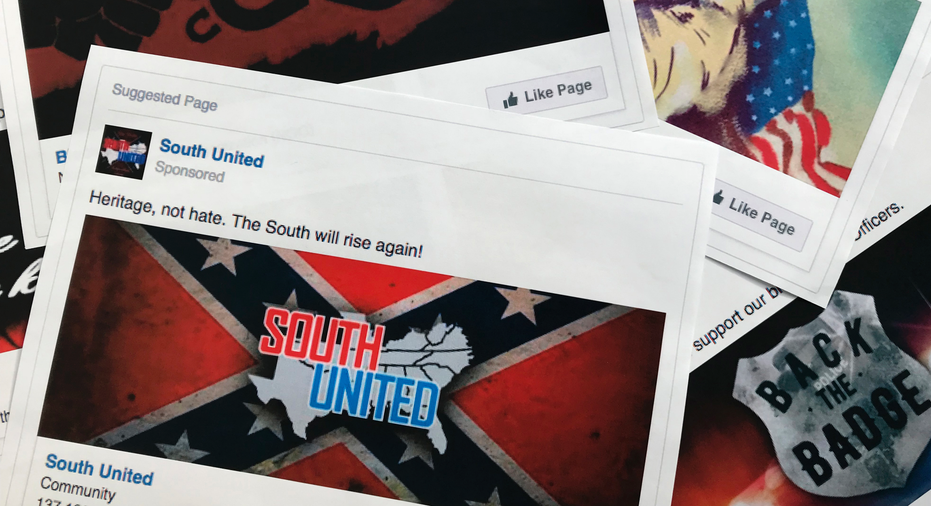Using common social media tactics to subvert US elections
NEW YORK – The latest efforts to disrupt the U.S. midterm elections through Facebook manipulation seem to be following a persuasion playbook refined by legitimate companies and organizations — but with a twist.
The aim of these possibly Russia-linked perpetrators appears to be to draw in as many people as possible with emotional appeals and then spur them to action. In this case, though, the action is public protest rather than affinity marketing, and the goal is to sow dissension rather than to build brand awareness.
"They're almost functioning like social media editors, figuring out what the trending topics are in the U.S. and figuring out where they can insert themselves," said Jennifer Grygiel, a communications professor at Syracuse University.
The idea, experts say, is to widen the rifts in the U.S. population via propaganda that is less about winning hearts and minds and much more about setting Americans against one another.
The removed pages share "moralistic language" and appeal to emotions, said Jay Van Bavel, a New York University psychology professor who studies group identity. "The conflict already existed but they're stirring it up, picking at a scab."
David Stewart, a marketing and business law professor at Loyola Marymount University, said those behind the scheme are trying to create an "us versus them" mentality, without which Facebook users might not be so polarized.
Groups tied to the Russian government have been trying to meddle in U.S. politics since at least the 2016 elections. In February, the Justice Department charged 13 Russians and three companies with plotting to aid Donald Trump's presidential campaign through fake Facebook posts, ads and groups.
More recently, Facebook said it had removed 32 apparently fake accounts and pages on Facebook and Instagram created by "bad actors" involved in what Facebook calls inauthentic political behavior ahead of the U.S. midterms. Although Facebook didn't specifically say Russians were behind the latest efforts, the reported activity shared many similarities with Russian influence campaigns during the 2016 presidential election.
It isn't clear how well the efforts worked or if they have swayed the outcome of elections, either in 2016 or this time around. Sowing discord, however, could prompt people to stay home instead of voting — or to vote for more extreme candidates who support their view, experts say. Discord could also lead to real-world violence and conflict.
During the 2016 elections, Russian agents bought a slew of issue-based ads to push arguments for and against immigration, gun rights and other issues. Many of them attempted to stoke racial divisions by mentioning police brutality or disparaging the Black Lives Matter movement.
Russian agents took advantage of the same tools available to businesses and groups to target messages with precision. One video parodying Trump was targeted at blacks who also were interested in BlackNews.com, HuffPost Politics or HuffPost Black Voices, for instance.
This time around, the efforts seem more focused on calling people to participate in protests and take action, at least based on the limited information provided by Facebook so far.
The removed accounts appear designed "to trigger standoffs between genuine Americans, bringing the risk of real-life violence from false stories," wrote the Digital Forensic Research Lab of the Atlantic Council, which has been working with Facebook to study misinformation and foreign interference on its services.
Those behind the accounts aren't spending a lot of time creating original posts. Instead, they do what many other people do on social media to get likes and clicks: They steal or reshare other people's posts.
From there, legitimate organizations sometimes spread the messages further.
"Americans thus became the unwitting amplifiers of Russian information operations," the Atlantic Council researchers wrote.
One indication that these efforts are working is that legitimate activist groups seem to have gotten swept up in some of the event listings created by these purportedly fake groups. For instance, several anti-racism groups attached themselves to a Washington protest called "No Unite the Right 2."
Though April Goggans, an organizer of Black Lives Matter DC, said the protest was organized by real people in the U.S., the event listing on Facebook was created by a left-leaning account that Facebook identified as fake. Facebook cancelled the account — and the listing — less than two weeks before it was to take place.
Overall, the 32 accounts Facebook deleted recently tried to organize about 25 events. About half took place, even though the unknown agents behind them had no one on the ground and had to coerce people into attending the events purely through Facebook.
Van Bavel said that suggests the agents behind this "have a fairly sophisticated understanding of what our weak spots are psychologically as Americans."
___
AP Technology Writer Barbara Ortutay contributed to this report.





















